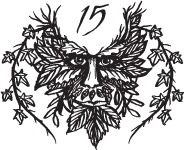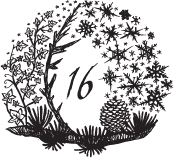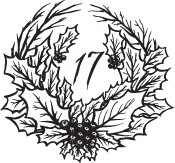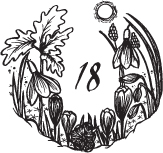Season of Secrets (6 page)
Authors: Sally Nicholls

Â
Â

Â
Â
There are two reasons why we don't live with Dad.
The first is his job. Dad's a journalist, which means
that people, i.e., his boss, keep ringing him up and
saying, “We need you to cover a story in Shepley,
sharpish.” And then he has to drive all the way to
Shepley and find out about whatever the story is
2
and
then he doesn't get home till late, sometimes not till
after we're in bed.
The second reason is that after Mum died, Dad
got sort of ill too. He went and worked twice as
late, every night (Auntie Rose was staying, so he
could leave us). And sometimes he would come
home and stare at nothing and not answer when
you tried to talk to him, which is scary when
homeless people do it, but doubly, triply, quadruply
scary when the person doing it is your own dad.
And Auntie Rose did all the important things, like
buy food, but all the extra things like piano lessons
and school shoes got forgotten about. Then one
day Grandma came, because Auntie Rose had to go
and see her own kids, and he started crying, right
there in the kitchen, and Grandma told me to go
outside, but I listened anyway, and I heard her say,
“You know we're always happy to have the children,
Toby.”
And when Grandma said that, it was as if there
were two bits of me. One bit was excited â because
I like Grandma, and I particularly like Grandpa, and
there's something grand and adventurous about
living in the country with your grandparents, like
being evacuated with a label round your neck. But
the other bit of me knew that the only reason it was
exciting was because it would never happen. Because
I couldn't ever believe, really, that a dad like ours, a
good dad, who loves us and doesn't lock us in
cupboards or forget to feed us, would ever, really,
abandon us.
But he did.
Â
Â

Â
Â
After Dad's gone, I come and stand in the shop door.
It's raining again. Not bucketing, cats-and-dogsy rain,
but a shivery, drizzly rain with flecks of silver in it; so
thin you can hardly be sure it's there. It hangs in tiny
droplets on the edge of the roof, and on my sleeve
when I hold it out.
“A drizzle,” I say, out loud.
“A mizzle,” says Grandpa. “A mizzle's finer.”
Mizzling. We're in the mizzle of a mizzle.
“Can I go out?” I say. “I found where the man is â
the one who vanished into nothing. He's hiding in a
little house. He's growing flowers.”
“All right,” says Grandpa. I'm still not sure he
believes me. “But try and stay dry.”
“I like being wet,” I say.
“All right for you, curly-mop,” says Grandpa. He
comes and stands behind me in the door. We watch
the rain.
“Don't be too angry with your dad,” he says,
suddenly. “He's doing his best.”
I tip my head back and look up at him, surprised.
He kisses my forehead.
“Go on,” he says. “Go and find your fella. Before I
change my mind.”
Â
Everything looks different in a mizzle. Like in a mist.
The trees the furthest away I can see are almost
invisible. Inmizzible.
I push open the barn door very, very slowly.
“Hello?”
He's there.
He's moved again. He's had to. His tree's grown. It's
not a sapling any more: it's a proper little tree. The top
branches hang above the tumbledown top of the wall.
There are little leaves, all covered in mizzle-beads.
Oak leaves, like picture-book clouds.
The ivy's grown, too. It stretches across half the
back wall. Little yellow flowers are pushing their way
through the floor. He's sitting with his back against
the trunk of the tree. He looks bright and strange and
wild-looking â and somehow older than he did
before. I can't work him out at all. At home, I think
maybe he's a tramp or an escaped prisoner or
something, but here I really believe he's a god, like
Miss Shelley says.
I take out my notebook and start right at the
beginning.
“What's your name?”
He frowns.
“Like, I'm Molly. Who are you?”
“I don't have a name like Molly,” he says. “Why
should I?”
He doesn't say it angry, like Hannah would, but
curious. Like he really doesn't know what I mean.
The next question on my list is,
Are you the god of
summer?
but somehow now I'm here I don't dare ask it.
I try something else.
“How old are you?”
If he
is
Miss Shelley's god, he was only born in the
spring.
“Older than an acorn.”
“Have you ever seen a winter?”
“A winter? Why? Have you lost one?”
“One's coming soon. Then you'll be cold.”
He gives me his most loving look.
“I don't get cold.”
I rest my chin on the top of my knees and wrap my
arms around them.
I'm
cold. Even here under the roof,
the rain still catches me when the wind blows in.
“Why can't anyone else see you? Why do you keep
disappearing?”
“Do you mind?” he says. “I don't want to worry you.”
“I
. . .
” I don't know what to say. He reaches out his
hand and touches mine. I shiver.
“I don't want them to find me,” he says.
“The hunt people?”
He doesn't answer. “You are being careful,” he says,
instead. “Aren't you? Nights are getting longer. The
Holly King's getting stronger
. . .
”
“The Holly King,” I say. “Who's he?” But I already
know the answer. “He's the man on the horse, isn't he?
The one who was leading the hunt? The one who's
after you?”
He closes his eyes again.
“Don't be frightened,” he says. “I don't want to
frighten you.”
“He couldn't hurt me?” I say. “Could he?”
“Of course he could.” He looks surprised that I
could even ask such a question. “Perhaps you
shouldn't come any more,” he says. “I don't want him
to hurt you
. . .
”
“Would he?” I say. He doesn't answer. “He wants
to hurt you,” I say. “Doesn't he?”
My man watches me without moving, leaning back
against the tree.
“Yes,” he says. “He wants to hurt me.”
We're quiet. I'm filled with uncertainty, mingled
with fear. Surely he can't just mean to sit here, waiting
for the Holly King to come? Surely he's going to do
something?
“Can't you use magic on him?”
“Magic?”
“Like you used to make my flower.”
“Your flower made itself,” he says.
“Can you make other things make themselves?” I
say, hopefully.
He starts to laugh and then it turns into coughing,
horrible, wet coughing, and I'm frightened. I don't
think he can stop, but he does, eventually.
“Are you all right?” I say.
He shakes his head. I wonder if I ought to go. But
he holds out his hand like he wants me to stay.
“You can do so much stuff,” I say. I'm thinking of all
the things that go with spring: celandines in the field
behind Grandpa's house, baby blackbird beaks opening
and closing in their nest in our plum tree, spider silk
shining on the grass in the mornings. “Can â” I stop.
“Do you make baby animals get born?”
He holds out his hand again, thoughtfully, turning
it so that the palm is upwards. I wonder if he's going
to make something for me â a baby mouse, maybe, or
a squirrel, perhaps. I'd like a squirrel. He must have
guessed what I'm thinking because he looks up, and
his eyes are laughing. “You can't make a baby without
a mother, can you?” he says, teasing. Ivy curls out of
the palm of his hand and up his arm. He holds up his
hand, watching it.
The muscles in my chest tighten. I look down at
the earth. “Could you make the mother too?” I say
quietly. “Could you make someone come alive for me,
if I asked you? Only, your face is on tombstones, my
teacher said. You're the god of rebirth, she said.
Someone dead â could you make them come alive?
Could you?”
He doesn't answer. I look up. But he's gone again.
Â
Â

Â
Â
Dad rings this evening.
“Are you all right, love?” he says.
I nod, then remember that he can't see me. “Yes,” I
say.
“Sorry I was so rotten, love,” he says. He sounds
tired, like most of him is somewhere else. “I'm doing
my best.”
“I know,” I say. I lean my head against the wall.
“I'm sorry too.”
“Peace?”
“Peace.”
We're quiet. I tap my heels against the stair, waiting
for him to say something.
“Did you have a good afternoon?” he says eventually.
“I went to see my man,” I tell him. “This man I've
met. He lives in a little house, like in a book, because
he's hiding from this hunt who are trying to kill him.
He can make things out of nothing, like trees and
flowers and magic potions.”
“Sounds useful,” says Dad. “Maybe you can
introduce me next time I come and see you.”
“Maybe,” I say doubtfully. “Only he won't let
anyone but me see him. He makes himself invisible.”
“Oh well,” says Dad. He gives a little half-laugh,
although I can't see what's so funny.
Hannah puts her head round the kitchen door.
“Dinner!” she says.
I cover the phone with my hand.
“D'you want to talk to Dad?”
Hannah shakes her head and vanishes.
“I've got to go,” I say.
“All right,” Dad says. He draws in his breath.
“Don't I get a kiss?”
I kiss my fingers and press them against the phone.
“There. Did you get it?”
“Waitâ” says Dad. “Yes â no â no â oh, yes!
There! Got it!”
“Your turn.”
“OK,” says Dad. I can hear him smiling. “Sending
now. Ready?”
I squeeze my eyes shut and wait for the time it
takes a kiss to travel all the way from Newcastle down
a phone line. The kiss zips down wires and across
space. It shoots through the receiver, and lands on my
cheek with a splat.
“Got it?” says Dad.
“Yes,” I say. “Got it.”
“Off you go, then,” says Dad. He sounds suddenly
sad. I put the phone down, so I don't have to hear.
Â
Â

Â
Â
The leaves on the trees are changing colour; turning
from green to yellow and falling from the sky. They
do it at home too, only you don't notice because there
aren't so many of them. There are rosehips in the
hedges and red berries on the hawthorn bushes, a cold
tang in the air and the fallen leaves to crunch through
in the grass.
In school one morning, a great wind blows up.
We all go out and try and catch the leaves as they
swirl down from the trees in the road. We gather
them up and take them back to press in dictionaries
and atlases. On Wednesday, we take them out and
laminate them and turn them into mobiles to hang
from the ceiling. Mrs Angus â who turns out to
know a lot about trees â teaches us the Latin names,
which we'd never have learnt in my old school. Oak â
Quercus robur
. Ash â
Fraxinus excelsior
. Hawthorn â
Crataegus monogyna
.
I like to think that they're the real name of the
tree, the friendly name you'd use it if it ever happened
to speak to you. Quercus Robur sounds funny and
friendly. Fraxinus Excelsior is brave, like a knight.
Crataegus Monogyna is a little frightening, a
shrivelled up old witch-tree with long red fingers.
We don't do holly, which is good, because I don't
want anything from the Holly King in my book. I
ask Miss Shelley about him, though.
“The Holly King?” she says. “Where did you hear
about him?”
“The man was talking about him. You remember â
I told you. The statue from the church, that I met.”
Across the table, Josh whispers something to
Matthew and Matthew sputters. Miss Shelley ignores
them.
“I see,” she says. “Well, the Holly King is another
pagan archetype. He's a counterbalance to the Oak
King â which is another name for your Green Man.
The Oak King rules in spring and summer and the
Holly King in autumn and winter.”
So my man's the good one and the Holly King's the
evil one.
“Do they fight?” I say. “Is that what counterbalance
means â that they're enemies?”
“Sort of,” says Miss Shelley. “Look, Molly, it's all
rather complicated. There are so many storiesâ”
But the Holly King's not a story! Why can't anyone
understand this? He's a real person, and he's after my man. The
Green Man or the Oak King or whatever his name is.
Miss Shelley's watching me. So's Emily, across the
table.
“The Holly King kills him,” I say. “He does,
doesn't he? The Green Man dies, that's what you said.
So does the Holly King kill him?”
“In some versions of the story,” Miss Shelley says.
“Yes. The Holly King and the Oak King fight at
midwinter and the Holly King defeats the Oak King.”
I clench my lips, tight as oak roots.
“Molly?” says Miss Shelley.
I look up.
“Does he have a hunt?” I say.
“A hunt?”
“A wild hunt? Does the Holly King have one?”
“Oh, the wild hunt,” says Miss Shelley. “All sorts
of people had a wild hunt, Molly. Woden and Odin,
Herne, of course â the Devil in some versions â King
Arthur in others. Even your Green Man is supposed
to lead it, in some stories.”
“He doesn't!” I say. “He wouldn't!”
Matthew snorts. Behind Miss Shelley's head, Josh
makes circling motions around his ear.
Crazy
.
“You stop that!” I say. Miss Shelley jumps.
“Molly!”
“It was Josh!” I say.
Â
At break, Hannah corners me.
“Why do you have to do that?” she says, pushing me
back against the playground wall. “Why do you have to
go on about hunts and stupid gods? Everyone thinks
you're mad. You do know that, don't you? If you have to
make up stories, at least pick ones that make sense.”
“It's
not
a story,” I say, furious. Hannah glares.
“Grow up,” she says. She drops her hands and
walks away.
I feel tears starting in the back of my eyes.
Hannah's supposed to be my sister. Sisters are
supposed to stick up for each other.
“Mum would have believed me,” I call after her.
She doesn't look back.
